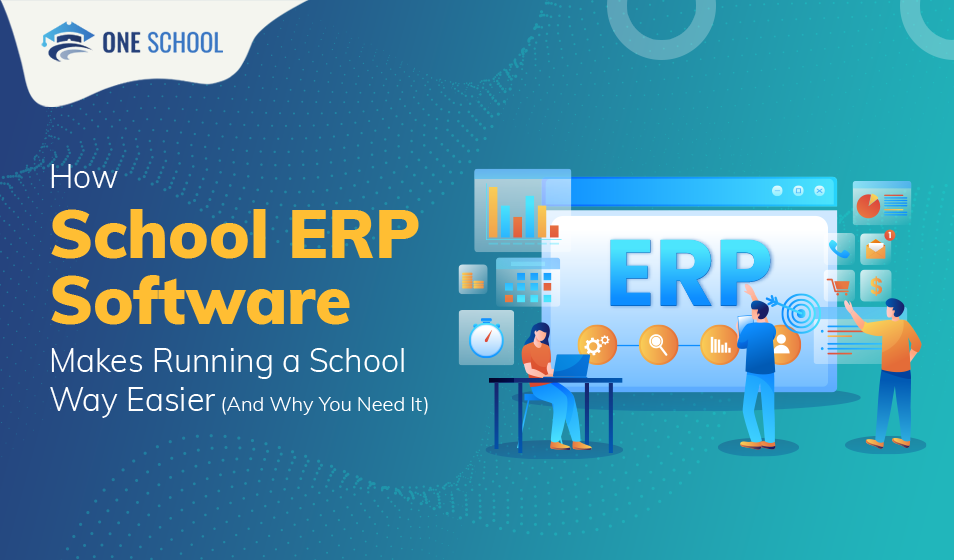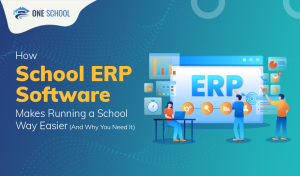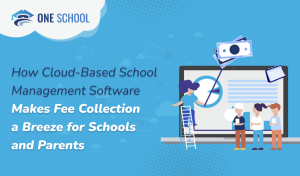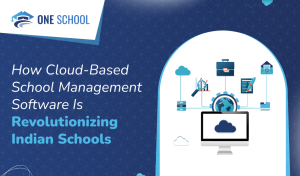Running a school is kinda like herding sheep while juggling knives. Between tracking attendance, chasing down late fees, and answering parent emails, it’s easy for things to slip through the cracks. And let’s be honest, nobody got into education because they love filing paperwork. That’s where school ERP software swoops in like a superhero.
ERP – short for Enterprise Resource Planning – sounds like corporate jargon, but really, it’s just a fancy term for a system that pulls all your school’s messy tasks into one tidy digital hub.
In this blog, we’ll break down how ERP software can save you time, slash administrative headaches, and even make parents stop blowing up your phones. No tech-speak, just real talk.
What Exactly Is School ERP Software?
Picture this: instead of digging through filing cabinets for Jimmy’s immunization records or wasting an hour manually calculating report card averages, you’ve got everything—attendance, grades, schedules, even cafeteria payments—in one searchable, clickable system.
School ERP software is basically your school’s brain transplanted into a computer. It remembers everything, never loses data and automates the boring stuff so your team can actually focus on students.
1. One System to Rule Them All: Goodbye, Paper Trails
Ever played detective trying to find a student’s old attendance sheet? Or worse, realize too late that two versions of the same spreadsheet exist? With ERP software, all your data lives in one place, updated in real time.
Why this matters:
- Need a student’s entire history? Pull it up in seconds.
- Teachers can check grades or attendance without chasing down the office.
- No more “Sorry, the system’s down” excuses during parent meetings.
2. Automate the Annoying Stuff (Because Life’s Too Short)
Let’s be real guys, nobody wakes up excited to take attendance or manually enter grades. ERP software handles these repetitive tasks for you.
How it works:
- Digital attendance gets logged straight into the system (no more lost sheets).
- New student? Their info auto-populates across class lists, health records, and everything.
- Grades entered by teachers automatically calculate averages and generate report cards.
3. Communication That Doesn’t Feel Like a Game of Telephone
Remember playing “telephone” as a kid? That’s what school communication often looks like without ERP: messages get lost between teachers, admins, and parents. Modern ERP systems fix this with built-in messaging:
- Teachers blast homework reminders to parents’ phones (no more “Johnny forgot his permission slip” excuses).
- Students get instant alerts for schedule changes, and no longer show up to empty classrooms.
- Parents can log in anytime to check grades or attendance, which cuts down on those “Why wasn’t I told?” emails.
4. Do More With Less (Yes, Really)
Here’s the dirty secret: schools waste a ton of time and money on manual processes. ERP software flips that by:
- Freeing up staff time (OneSchool reclaimed 20+ hours a week—that’s an extra staff member’s worth of productivity).
- Reducing printing costs (goodbye, stacks of paper report cards).
- Cutting down on payroll errors (automated timesheets lead to happier staff).
5. Grades That Actually Help Students (Not Just Stress Them Out)
ERP systems aren’t just about admin; they’re secret weapons for teaching. Teachers can:
- Spot struggling students faster (the system flags kids with slipping grades).
- Customize reports to show parents why their kid is struggling with math (not just that they are).
- Analyze trends (like 80% of the class bombed the same quiz question — maybe it’s the curriculum, not the kids).
6. Parents: From Helicopters to Helpers
Parents want to be involved, but nobody’s got time for daily check-ins. ERP software meets them halfway by giving 24/7 access to:
- Attendance (so they know when their kid’s “sick day” was actually a beach trip).
- Grade updates (no more report card shockers).
- Fee payments (late notices auto-send, so you’re not playing debt collector).
The Conclusion
School ERP software isn’t just a “nice-to-have” anymore; it’s the difference between drowning in paperwork and running a school. Less chaos, fewer errors, happier parents, and staff who aren’t constantlyout? Sign up for the future with OneSchool.

At OneSchool, Nishant Joshi manages projects centered on school ERP solutions as a technology strategist and project manager. He focuses on putting in place and refining digital systems that support improved educational outcomes, increase administrative effectiveness, and improve school operations.






